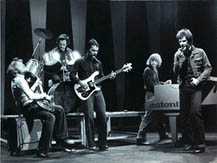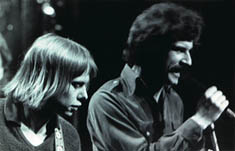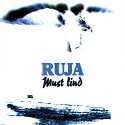 |
Vol 1, No 19
1 November 1999 |
|
|
 M U S I C:
M U S I C:
Rock Estonian Style Mel Huang If we delve into the surprisingly long and accomplished history of Estonian rock music, the one group that serves as a major focal point is Ruja. This experimental and groundbreaking group managed to gain massive public devotion, while developing its intricate pieces into some of the best examples of progressive rock. Ruja easily kept pace with similar music heard on illegally imported cassettes, from bands such as Genesis, Yes, Emerson Lake and Palmer and King Crimson. However, throughout its 17-year existence (which began in 1971), the band kept a distinct Estonian flavour in its music and became the best-loved cult rock band in the country. Its former members are a "who's who" of the current Estonian music world, many of them famous beyond the country's borders. Looking at the history of this band and all the changes in personnel it has witnessed (comparisons to rock giant Yes are not unfounded - both in this aspect as well as in the music), it is clear that Ruja persevered because its music was unique - even in Estonia. Despite going through several stages and transformations, Ruja's music is still best described by the Estonian adjective "rujaline," translated loosely as "Ruja-like." Former members include several world-renowned composers and pianists such as Rein Rannap and current conductor of the Estonian National Symphony Paul Magi (trumpet, saxophone). Even a young Erkki-Sven Tuur penned a Ruja favourite, "Avamine" (Opening), which soon after lead to his formation of the progressive rock giant In Spe; Tuur has since become one of the most famous contemporary composers in the world, alongside the enigmatic Arvo Part. 
Throughout Ruja's different periods, the unique guitar sounds of long-time guitarist Jaanus Nogisto have served as something of a trademark. However, pretty much for the band's entire history, the core - the soul - of Ruja has been its singer, the unique Urmas Alender. A mixture of humour, power and emotion is projected from this charismatic frontman, bringing the audience to tears one moment and uncontrollable laughter the next. Listening to humorous songs such as "Klaperjaht" (The Chase) or the emotional "Sugispaev" (The Autumn Day) shows the total command Alender has over the spirit of the band's music and its unique lyrics. By rarely writing its own lyrics, Ruja has managed to project the poetry of some of Estonia's top modern poets into the hearts and minds of the nation's youth. The words of well-loved lyricists such as Hando Runnel come alive with the band's intricate music and Alender's captivating voice, exposing a new generation to the poet's thoughtful words. In Ruja's hands, Ott Arder's poem "Eile Nagin Ma Eestimaad" (I Saw an Estonia Yesterday) was turned into a punk rock hit that gave the Soviet authorities a massive headache. Throughout the years of Soviet rule, the hopes of an independent Estonia flowed through the energy of Ruja's music. The band lived through much over its long career, which spanned from 1971 to 1988. It faced many adversities, such as KGB harassment, arrest as well as the banning of some of its material. Unlike bands of a comparable calibre in the West, Ruja did not have the opportunity to release many recordings. Though most Estonians of its generation knew several dozen of the band's tracks by heart, Ruja only had the opportunity to release four recordings during the Soviet era. One was even a Russian-language version of some of their better-known songs - an attempt to break into the Russian market. That success brought their tour to places as far away as Turkmenistan and Siberia. 
However, the band did not survive the turmoil of the late 1980s. Wrought by tensions among its members, Ruja called it quits in 1988. Sadly, Ruja did play one reunion concert in autumn of 1994 - to commemorate the death of its singer, Urmas Alender, who died tragically along with 852 others when the ferry Estonia sank between Stockholm and Tallinn. A limited memorial CD, Must Lind (Black Bird), was released. Although on that evening guitarist Jaanus Nogisto said, "This is the first, and last time, Ruja plays without Urmas Alender," the music undoubtedly lives on among the band's loyal fans. Recently, several former members decided to finally release the many hours of the band's archived material. Though most of the repertoire was never released, frequent airplay over the past few decades and inclusion on the setlists at hundreds of Ruja concerts has kept the "hidden" songs familiar for most of that generation. The release of Ruja's material has since turned into the biggest rock music project in Estonian history and will constitute a five-CD box set to appear in December. This will satisfy Ruja's thousands of fans, who will finally have in their hands old unreleased classics such as "Ahtumine" (Narrowing) and "Lumi Sadeles" (The Snow Glittered). It will also be a great opportunity to expose Ruja to the world, as a growing number of foreign fans of this genre of music have become enamoured with the uniqueness of its songs. Estonia's best-known rock band, though long gone, will bring the nation's rock music into the next century as strong as ever. Mel Huang, 19 October 1999 For more information, go to the Estonian Progressive Rock website and read its history of Ruja.
|
|
![]()
Copyright (c) 1999 - Central Europe Review and Internet servis, a.s.
All Rights
Reserved
